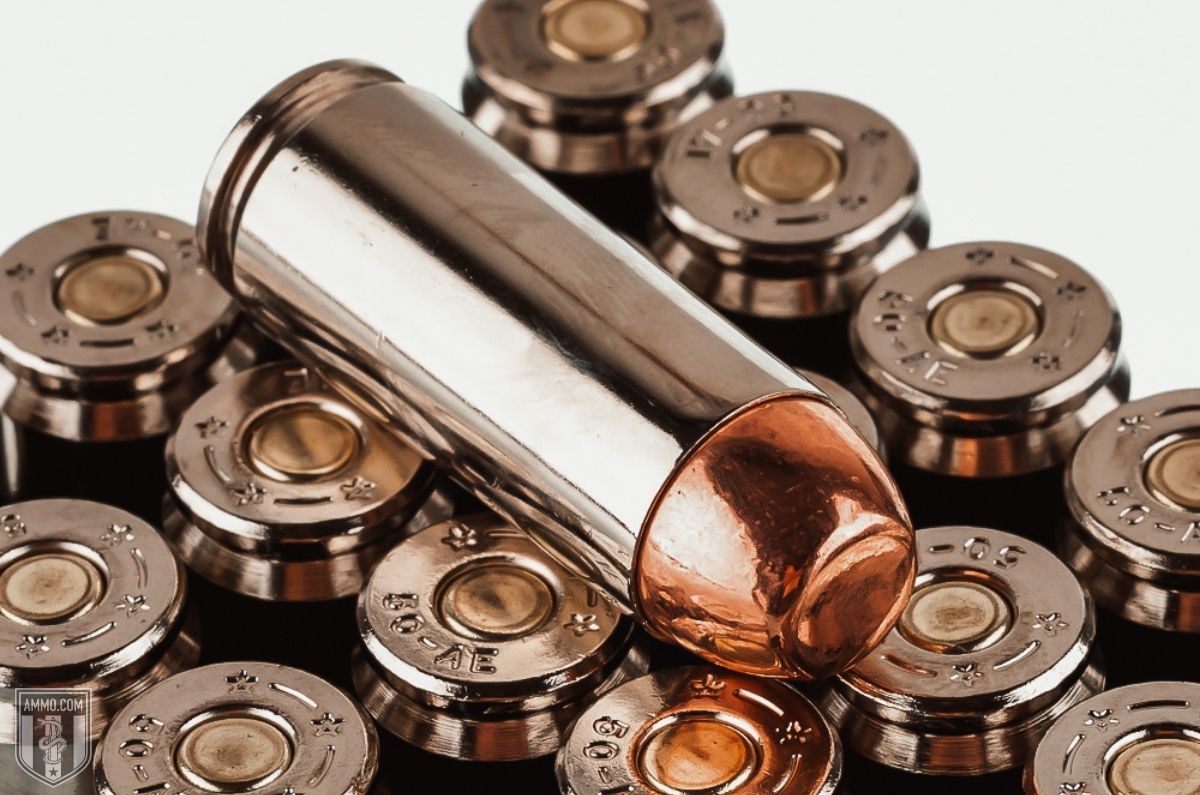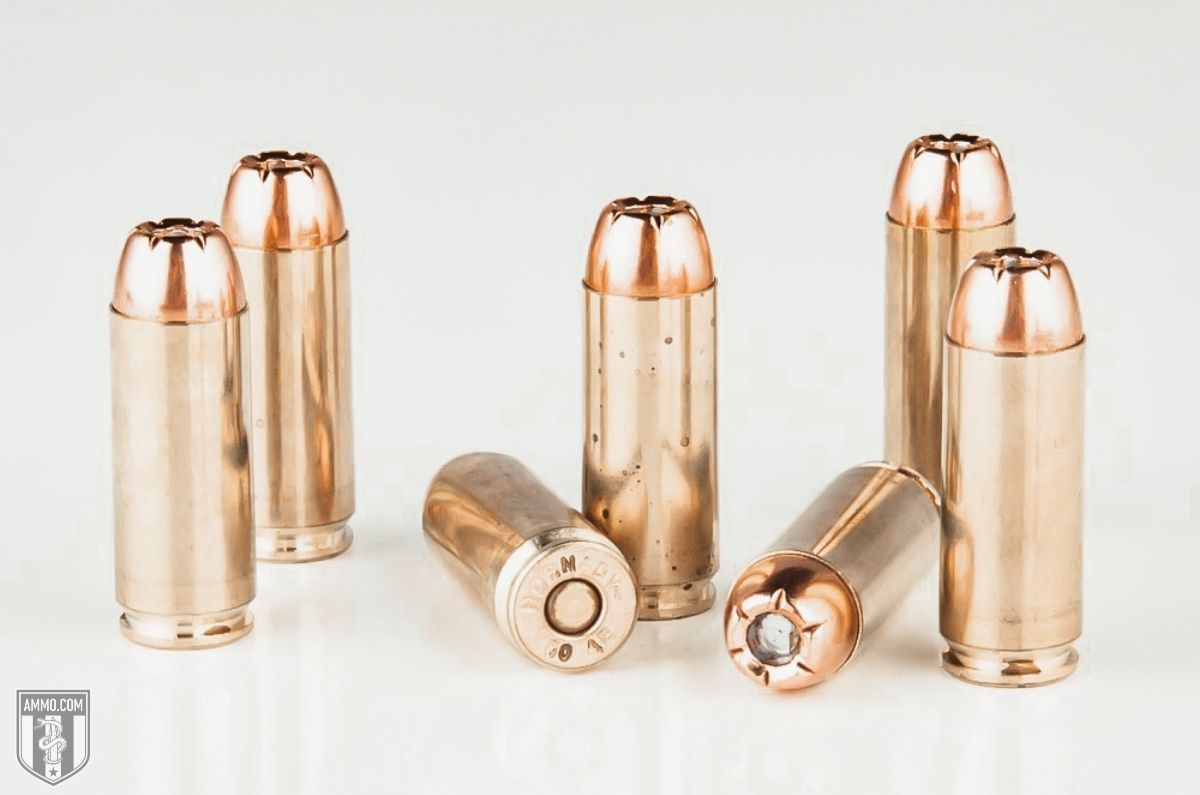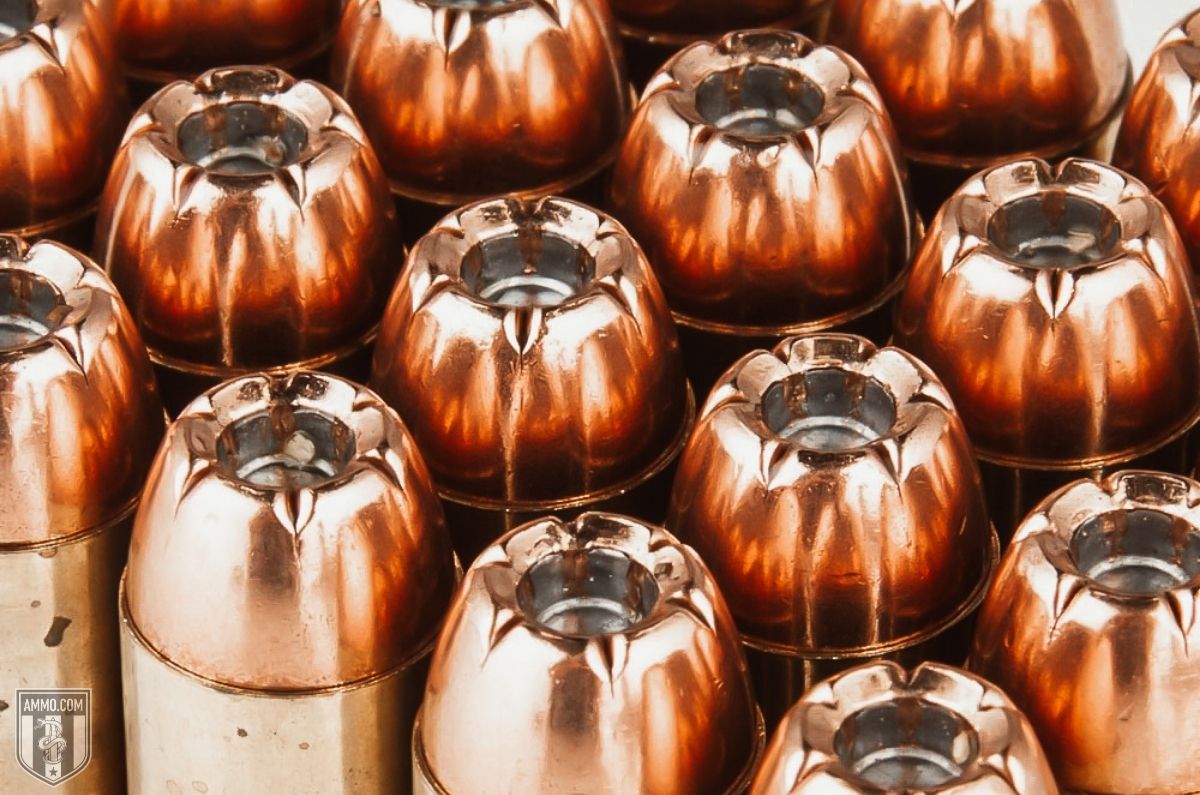50 Beowulf vs 50 AE: Extreme Semi-Auto Stopping Power
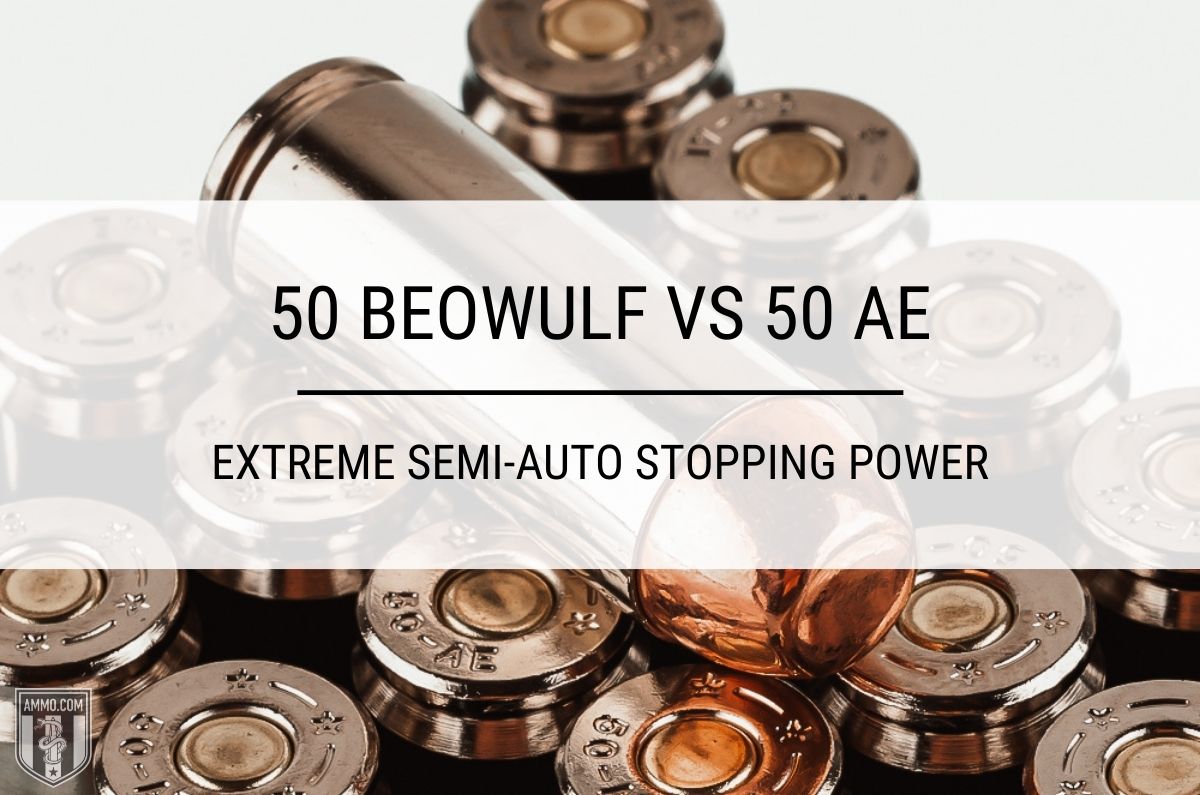
The 50 Action Express (50 AE) and 50 Beowulf are two centerfire rounds that are known for their massive size, bone crushing kinetic energy, and extremely high recoil.
Although the 50 AE is the parent case for the 50 Beowulf, each round was designed with different goals in mind. The 50 Beowulf (or 50 Beo for short) was developed as a rifle cartridge to enhance the stopping power of the AR-15 carbine while the 50 AE is the classic chambering for the Desert Eagle handgun.
Although these two cartridges are extremely similar, there are some key differences to consider when deciding on purchasing one of these heavy hitting self-defense rounds.
In this article, we will evaluate the 50 Beowulf vs. 50 AE to help you understand the differences between the two and give you a clearer idea of which cartridge is better for your shooting needs.
What is the difference between 50 Beowulf and 50 AE?
The obvious difference between 50 Beowulf and 50 AE is that the 50 Beowulf has a slightly longer case length than the 50 AE. Furthermore, the 50 Beowulf was designed to be used in a standard AR-15 and is considered a rifle cartridge, while the 50 AE was conceived as a handgun cartridge.
Cartridge Specs
When evaluating centerfire cartridges, it’s a good idea to analyze their specs to gain more knowledge of both.
The 50 Action Express (50 AE) was developed in 1988 by Evan Whildin, then vice president of Action Arms, Ltd. The goal of the cartridge was to dramatically increase the power level of semi-auto handguns. It now serves as the primary chambering for the Magnum Research Desert Eagle. The 50 AE is a unique design without a parent case.
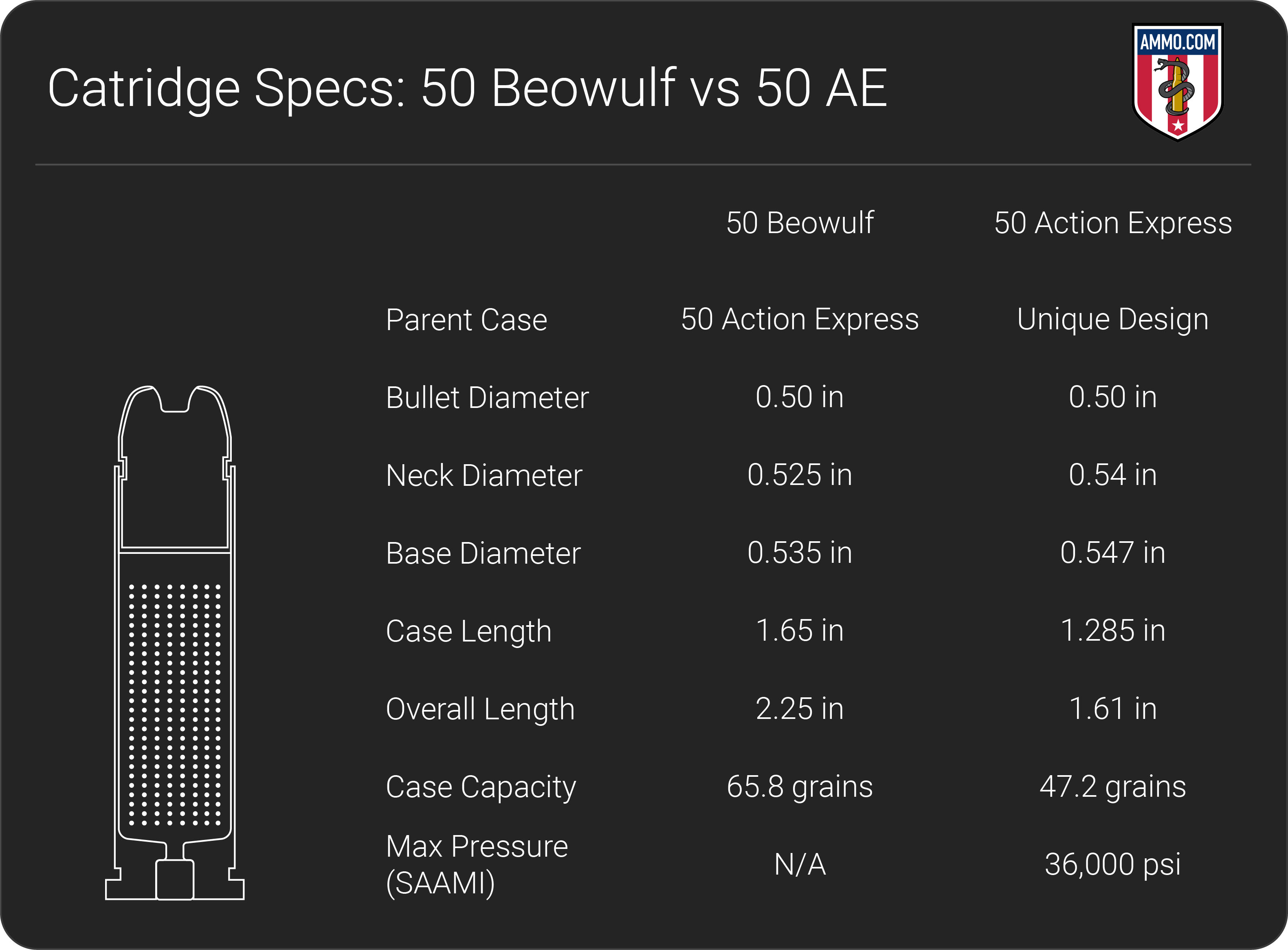
In contrast, the 50 Beowulf round was developed to increase the ballistics of the standard AR-15. Designed by Alexander Arms in 2001, not much is known about the genesis of the 50 Beowulf as Bill Alexander is known for keeping company matters a closely guarded secret.
The Alexander Arms .50 Beowulf was developed using an elongated 50 AE as the parent case.
The 50 Beo was the first cartridge known as a “thumper round,” designed to take down big game with a single shot per specs laid out by American shooting legend Lt. Col. Jeff Cooper.
To read more about big bore AR thumper rounds, check out this article: 450 Bushmaster vs 458 SOCOM vs 50 Beowulf.
One major similarity between the two cartridges is that they fire diameter 0.50” bullets. This means both rounds are capable of firing extremely heavy bullets.
The 50 Beowulf cartridge typically fires bullets weighing between 200 and 600 grains, with 335, 350 and 400 grain bullets being the most common. In contrast, the 50 AE can fire loads between 230 and 380 grains, with the 300 and 325 grain bullets being the most popular.
Both rounds utilize a straight-wall case design (with a slight taper to increase feeding reliability). A straight-walled case is necessary for deer hunting in Midwestern states like Ohio, Iowa, Indiana, and Michigan.
Both rounds have a rebated rim design, meaning their rims are narrower than their bases. The Beowulf has a 0.447” diameter rim (which is the same as another round made by Alexander Arms: the 6.5 Grendel). In contrast, the 50 AE has the same rim diameter as the 44 Remington Magnum at 0.514”.
One major difference between these rounds is their case lengths (and by extension their overall lengths). During development of the 50 Beo, Bill Alexander elongated the 50 AE case to meet his ballistic specifications. As such, the 50 Beowulf measures nearly half an inch longer than the 50 AE at 1.65” and 1.285”, respectively. Overall length follows the same trend with the 50 Beowulf being longer at 2.25”, compared to 1.61” for 50 AE.
The longer case length of the 50 Beowulf allows it to hold a considerable advantage over the 50 AE in terms of case capacity. The Beowulf can pack in nearly 65.8 grains of propellant, compared to 47.2 grains for the Action Express.
The final difference between these cartridges is their maximum chamber pressures. The 50 AE is rated to handle 36,000 psi per SAAMI specs; however, the 50 Beowulf is not a certified cartridge. As the “50 Beowulf” name is trademarked by Alexander Arms, SAAMI avoids potential trademark litigation by abstaining from certifying the cartridge.
To squirm around this potential legal issue, some ammo manufacturers brand their 50 Beowulf ammo by its metric designation: 12.7x42mm.
Recoil
Recoil is an important consideration when purchasing a new rifle, as a round with heavy recoil will be more difficult to control and will slow your rate of follow-up shots.
Free recoil is determined by muzzle velocity (fps), propellant weight, bullet weight, and firearm weight.
It will be impossible to provide a pure “apples to apples” comparison of both rounds, as the 50 AE is fired from a handgun while the 50 Beo is fired from a heavier AR-15 carbine. For this comparison we will consider the test firearm for the Alexander Arms .50 Beowulf Tactical AR-15 (9 pounds). The 50 AE firearm will be a Magnum Research Desert Eagle (4.8 pounds).
The rounds to be compared will be the Underwood 350 grain XTP load for 50 Beowulf with a muzzle velocity of 1,775 fps and the 50 AE Underwood Ammo 325 grain bonded jacketed hollow point (JHP) leaving the muzzle at 1,475 fps.
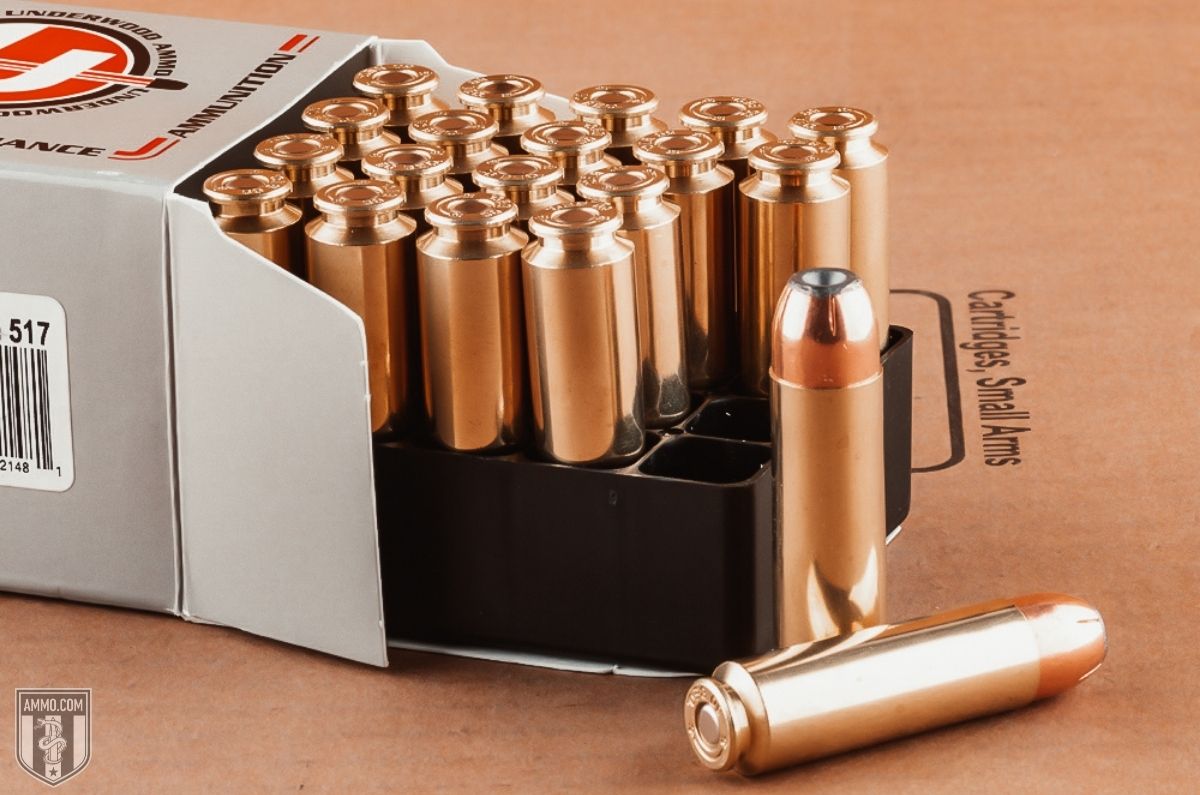
Given these rounds, the 50 Beowulf has a free recoil of around 28 ft-lbs, while the 50 AE will have recoil of 27 ft-lbs.
It might be tempting to think that those numbers are almost the same so the recoil would be similar. However, it’s important to remember that felt recoil and free recoil are two very different things. Free recoil can be calculated, while felt recoil will differ from shooter to shooter based on grip, stance, body composition, and the firearm being used.
Although the 50 AE technically has less free recoil, it’s important to bear in mind that a handgun only has two points of contact while a carbine has three. The shoulder stock will do quite a lot for increasing control of the firearm as well as dissipating recoil throughout the shooter’s torso, as opposed to the wrists like a handgun will.
Furthermore, many 50 Beowulf upper receivers come from the factory with a muzzle brake installed. A muzzle brake helps reduce muzzle rise and felt recoil by redirecting gasses escaping the muzzle when a bullet is fired.
Although the 50 Beowulf has slightly more free recoil, most shooters would agree that the 50 AE has more felt recoil due to it being fired from a handgun.
Muzzle Velocity, Kinetic Energy and Trajectory
For this comparison, we will look at two popular factory loads for each cartridge. For the 50 Action Express we will compare the Hornady 300 grain XTP and the Underwood Ammo 325 bonded JHP. For the 50 Beowulf, we will analyze two popular self-defense rounds from Underwood Ammo: the 350 grain Hornady XTP and the 420 grain Xtreme Penetrator.
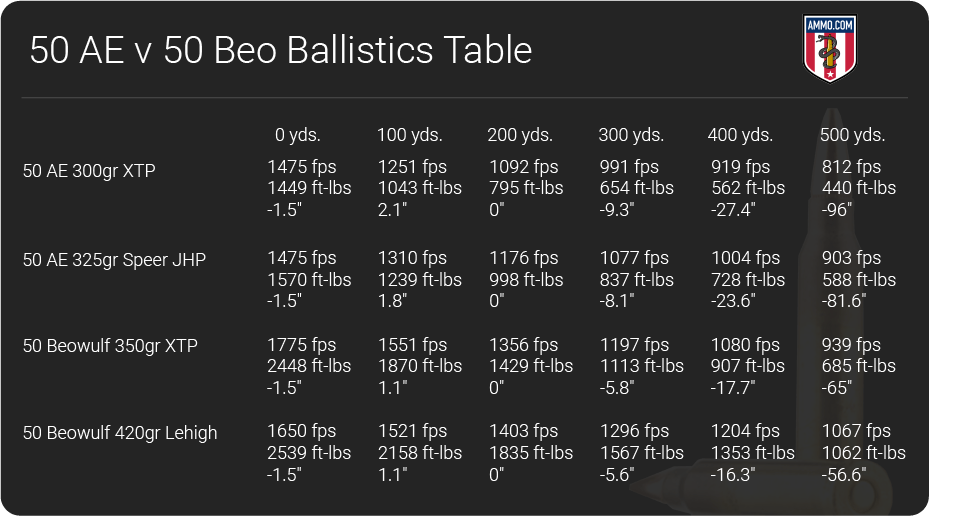
As you can see, the 50 Beowulf cartridges surpass the 50 AE in all ballistic categories.
Thanks to its higher case capacity, the 50 Beowulf has about 300 fps higher muzzle velocity than the 50 AE. The Beowulf loads left the muzzle at 1,775 fps for the 350 grain XTP and 1,650 fps for the Lehigh Penetrator rounds, while both 50 AE loads had a muzzle velocity of 1,475 fps.
The difference in muzzle velocity should not be surprising, as the 50 Beowulf not only has higher case capacity, but it is also fired from a rifle with a longer barrel. A longer barrel allows the gunpowder to completely burn, while a shorter barrel length can allow for unburnt powder.
A typical Beowulf AR-15 has a 16” barrel, compared to 6” for a standard Desert Eagle (or 10” with a custom Magnum Research barrel).
The higher muzzle velocity of the 50 Beo also means that its bullets will reach the target faster, and translates to a flatter trajectory. At 200 yards, the two 50 AE loads exhibited -27.4” and -23.6” of bullet drop compared to -17.7” and -16.3” for the Beowulf.
In terms of kinetic energy, the 50 Beowulf dominates the 50 AE by a wide margin. The 300 and 325 grain bullets for the 50 AE leave the barrel with 1,475 and 1,570 ft-lbs, respectively. In contrast, the 50 Beowulf 350 grain XTP and 420 grain Lehigh Penetrator leave the muzzle with 2,448 and 2,539 ft-lbs of energy, respectively.
Ballistic Coefficient and Sectional Density
Ballistic coefficient (BC) is a measure of how aerodynamic a bullet is and how well it will resist wind drift. Sectional density (SD) is a way to evaluate the penetration ability of a bullet based on its weight and diameter.
For 50 Beo, the 420 grain Lehigh Penetrator has a G1 BC of 0.25. The 350 grain XTP measures in with a 0.15 G1 BC. The ballistic coefficient numbers for the 50 Action Express are also not impressive, as the 300 grain XTP has a G1 BC of 0.12 while the 325 grain JHP has a G1 BC of 0.169.
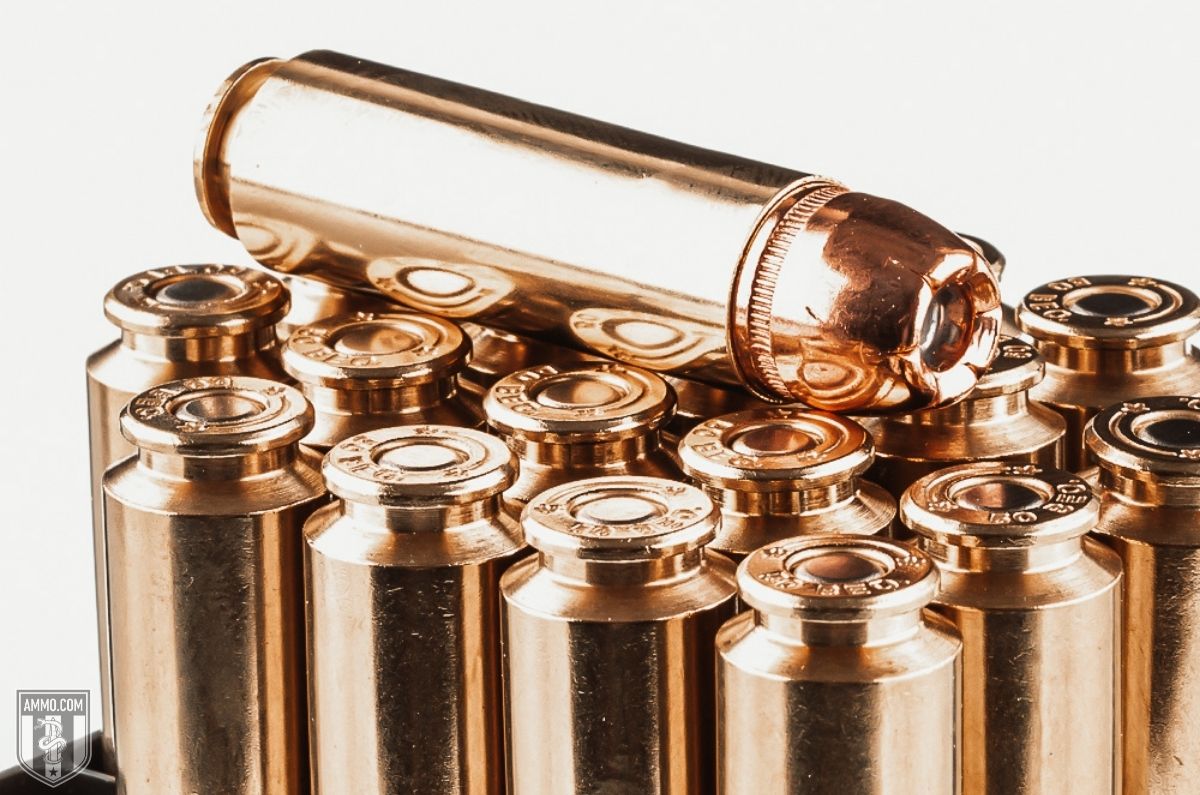
Admittedly, these ballistic coefficient numbers are not as impressive as another well-known .50 caliber round: the 50 BMG, which often has a G1 BC that exceeds 1.0. The weaker rounds’ lower BCs primarily stem from bullet design. The bullets used by the 50 Beowulf and 50 AE are short, thick, and not as aerodynamic. This makes them less effective for long range shooting – but great at relatively close-range engagements.
Although these .50 cal bullets are not designed as sleek long-range shooters, they hit hard and penetrate deep which is reflected in their sectional density measurements. For the Beowulf bullets, the Lehigh Penetrator 420 grain bullet has the highest SD of the four at 0.24, while the 350 grain XTP has an SD of 0.20. In contrast, the 300 grain XTP has an SD of 0.171 while the 325 grain JHP has an SD of 0.186.
Self-Defense/Home Defense
Both 50 Beowulf and 50 AE are more than sufficient for self-defense.
When it comes to stopping power, you cannot go wrong with either round. To put this in perspective, both the Beowulf and Action Express have more kinetic energy at 200 yards than a 45 ACP has at the muzzle.
Although expanding bullets are loaded in both rounds, overpenetration is of serious concern.
Both rounds are extremely powerful, to the point where they would almost certainly over-penetrate when used at engagement distances typical for home defense situations.
Many shooters might view the Beowulf cartridge a bit much for home defense, as the massive amount of kinetic energy it delivers can be a liability due to over-penetration. There’s no reason you couldn’t employ the Beowulf for self-defense, but you need to be absolutely sure of what lies behind your target (per the safety rules of shooting, which you should treat as gospel regardless of which cartridge you’re firing).
Of the two rounds, the 50 AE would likely prove the better choice for self-defense.
Hunting
Both the 50 AE and 50 Beowulf are excellent choices for hunting big game like whitetail or feral hogs.
Hunters appreciate the massive amount of kinetic energy both rounds bring to the table, as they are both capable of taking down whitetail. Range is a serious consideration, however, as neither round is well suited for long-range shots.
Therefore, most mule deer hunters will opt for a round with more range like a 308 Winchester or 300 Win Mag.
For whitetail hunters who operate in heavily wooded areas, the 50 Beowulf makes an excellent option as it offers fast follow-up shots and an effective range around 150-200 yards depending on your load of choice.
The 50 AE can also be used for deer hunting, and is a fun option if your state allows handgun hunting. There’s just something different about taking aim at a deer with a semi-auto handgun, and the newer Mark XIX Desert Eagle comes directly from the factory with a top rail for mounting optics.
The 50 AE is limited in its hunting range to around 50-100 yards for whitetail.
Both rounds have enjoyed success when it comes putting hogzilla in his place. A big-bore AR-15 makes a potent hog-killing machine thanks to fast follow-up shots and plenty of kinetic energy. Feral hogs are a real issue for farmers in the southern United Sates in particular, as a herd of hogs can destroy an entire field in a single night.
The 50 AE is also an excellent choice for hogs if you prefer handgun hunting – or want the added challenge of having to be closer to your prey.
If hunting with an AR-15 carbine is permitted in your state, the 50 Beowulf will make a better choice for big game thanks to its longer effective range. If you cannot hunt with an AR-15 or are restricted to handguns, then the 50 AE will get the job done so long as you understand its range limitations.
Ammo and Rifle Cost/Availability
There’s no denying the power level of either cartridge. Sadly, with great power comes great price tag.
Inexpensive FMJ target ammo for both cartridges typically runs close to $2/round, with premium hunting or self-defense ammo fetching close to $3/round or more.
Ammo availability is also a major issue, as only a few manufactures currently produce either type of ammunition.
Alexander Arms is the primary supplier of most 50 Beowulf ammo. Underwood Ammo and Black Butterfly also offer several varieties of Beowulf under its metric designation of 12.7x42mm.
On the other hand, several companies manufacture 50 AE. Underwood Ammo is a major supplier, and Magnum Research, Buffalo Bore, Hornady, and Federal also produce 50 AE.
The 50 Beowulf is clearly the winner in terms of firearm availability, as any standard AR-15 chambered in 5.56 NATO can be converted to fire the Beowulf cartridge by changing its bolt, barrel, and adding single stack magazine followers.
Factory-produced 50 Beowulf AR-15 rifles are predominantly available from Alexander Arms (due to their copyright). Alexander Arms is also the primary supplier of all parts and upper receivers for the 50 Beowulf, though Bear Creek Arsenal is another option at a lower price point.
The 50 Beowulf is only available for the AR-15 at the time of writing.
The 50 AE is predominantly chambered in the Magnum Research Desert Eagle, although several other firearms can handle the cartridge. Magnum Research also manufactures the BFR, which is a revolver chambered in 50 AE. The LAR Grizzly Win Mag, AMT AutoMag V, and Freedom Arms Model 555 are three other handguns chambered in 50 AE.
In terms of cost, a 50 Beowulf upper receiver from Alexander Arms runs close to $1,000 (as of summer 2022). If you want a Desert Eagle, expect to drop no less than $2,000 or more depending on the model and cosmetic features.
Reloading
Reloading is one method shooters use to reduce their overall cost per round and increase the consistency of their ammo. Furthermore, handloads can be tailored to your specific handgun or rifle to meet your shooting criteria.
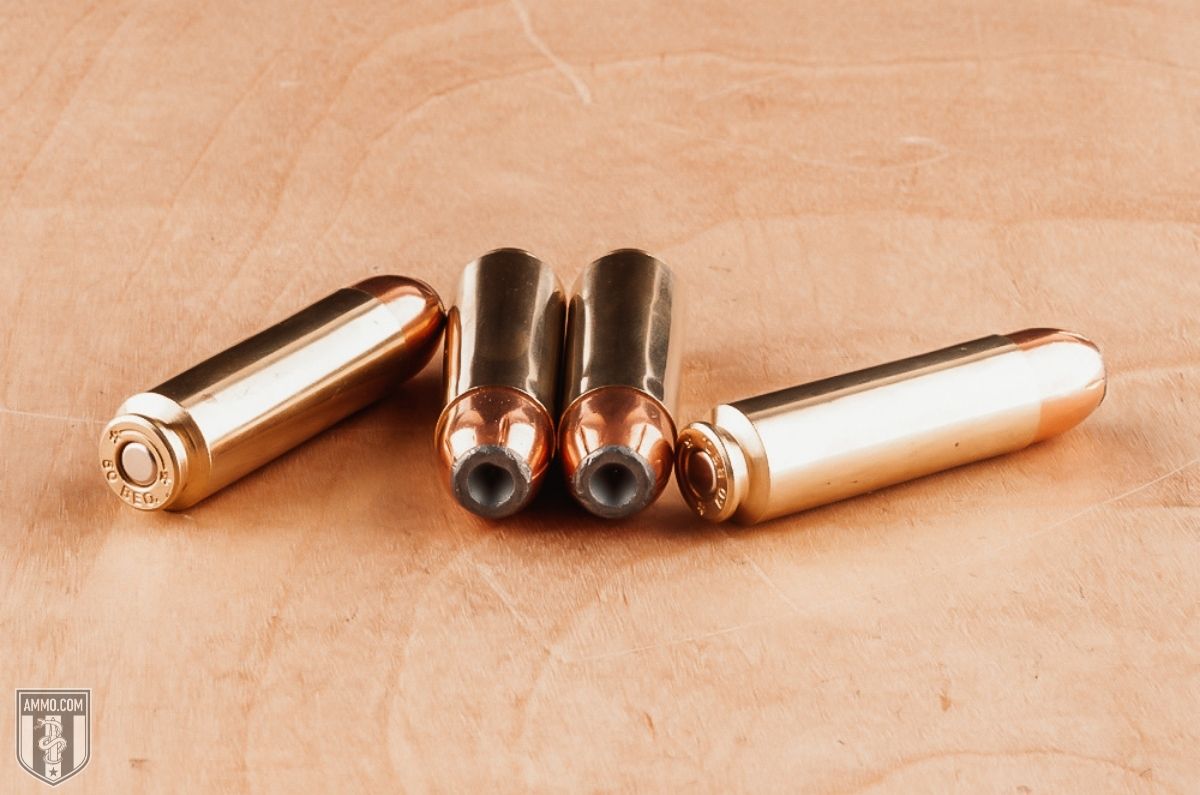
Although both rounds have a straight-wall case, case lubricant will need to be used for resizing as carbide dies are not available for either cartridge.
Reloading dies are readily available for both calibers, as Lee, RCBS and Hornady manufacture dies for the 50 AE. Lee, Lyman and Hornady all have offerings for 50 Beowulf as well.
Factory-fresh brass is primarily available from Starline for both cartridges, though Alexander Arms offers factory headstamped 50 Beowulf brass. For bullets, manufacturers like Hornady, Speer, Barnes and Sierra all have .50 cal options ready for reloading.
Final Shots: 50 AE vs 50 Beowulf
The Alexander Arms 50 Beowulf and the 50 Action Express are two centerfire rounds that share the same caliber bullet but were designed for drastically different firearms.
The 50 Beowulf is a big bore AR-15 cartridge that was designed to be a viable one-shot whitetail cartridge as well as increase the overall stopping power of the rifle.
The 50 Action Express was designed to increase the power level of semi-auto handguns that can be used for hunting as well as self-defense purposes.
Picking between these two cartridges really depends on what you want to do with them. If you want a high-energy rifle, then go with the 50 Beowulf. If you want a massive hand cannon, go with the 50 AE. Both cartridges work well for large game hunting, though a Beowulf AR-15 gives you added range and faster follow-up shots.
There is something inherently awesome about firing a .50 caliber bullet that cannot be measured on any ballistic chart. Ultimately, you cannot go wrong with either round!
No matter which cartridge you choose, make sure you stock up on ammunition here at Ammo.com. I’ll see you at the range!
Ammo Comparisons
- .308 vs 5.56
- 6.5 Creedmoor vs .308
- .300 Blackout vs .308
- .300 Win Mag vs .308
- .243 vs .308
- .308 vs .30-06
- 7mm-08 vs .308
- .270 vs .308
- 7.62x39 vs .308
- .223 vs .308
- .338 Lapua vs .308
- .380 ACP vs 9mm
- .223 vs 5.56
- .300 Blackout vs 5.56
- 9mm vs 45 ACP
- 9mm vs 40 S&W
- .357 SIG vs 9mm
- 10mm vs 9mm
- 9mm vs 9mm Luger
- .243 vs .270
- .300 Win Mag vs .30-06
- .270 vs .30-06
- .40 vs .45
- 38 Special vs 357
- 9mm vs 40 vs 45
- 5.56 vs 7.62x39
- 338 Lapua vs .30-06
- .30-30 vs .30-06
- 300 PRC vs 338 Lapua
- .30-06 vs 7mm
- 300 Win Mag vs 338 Lapua
- 300 PRC vs 300 Win Mag
- 300 WSM vs 300 Win Mag
- 338 Win Mag vs 338 Lapua
- 12 Gauge vs 20 Gauge
- 10mm vs 357 Mag
- .30-30 vs 7.62x39
- 224 Valkyrie vs 22-250
- 17 HMR vs 22 Mag
- 7.62x39 vs .300 Blackout
- 45 ACP vs 45 Auto
- 45-70 vs 30-30
- 300 Blackout vs 223
- 357 Magnum vs 9mm
- 350 Legend vs 300 Blackout
- 224 Valkyrie vs 223
- 45 ACP vs 38 Super
- 6.5 Grendel vs .308
- 17 HMR vs 22 LR
- 10 Gauge vs 12 Gauge
- 22-250 vs 223
- 45 Colt vs 45 ACP
- 350 Legend vs 30-30
- 5.7x28 vs 223
- 5.7 vs 9mm
- 5.56 vs 5.7
- 22 vs 9mm
- Buckshot vs Birdshot
- 450 Bushmaster vs 308
- 450 Bushmaster vs 223
- Buckshot vs Slug
- 6.5 Grendel vs 5.56 vs 223
- 6mm ARC vs 6.5 Grendel
- 44 vs 45
- 458 SOCOM vs 5.56
- 357 vs 44
- 32 ACP vs 380
- 300 Win Mag vs 338 Win Mag vs 338 Lapua Mag
- 450 Bushmaster vs 458 SOCOM vs 50 Beowulf
- 6mm Creedmoor vs 6.5 Creedmoor
- TMJ vs FMJ
- 44 Special Vs 44 Magnum
- 45 90 vs 45 70
- 6.8 Western vs 6.8 SPC
- 50 Beowulf vs 50 BMG
- 26 Nosler vs 6.5 PRC
- 28 Gauge vs 410
- 6.8 SPC vs 5.56
- 6.8 SPC vs 6.5 Grendel
- 6.8 Western vs 7mm Rem Mag vs .28 Nosler
- 6.8 Western vs 6.5 Creedmoor
- 22 Hornet vs 223
- 6.8 Western vs 6.5 PRC
- .410 vs 12 Gauge
- .410 vs 20 Gauge
- 22 LR vs 22 Mag
- 6mm ARC vs 243
- 7mm-08 vs 270
- 243 vs 6.5 Creedmoor
- Nickel vs Brass Casing
- 204 Ruger vs 223
- 50 Beowulf vs 5.56
- 260 Remington vs 6.5 Creedmoor
- 6mm Remington vs 243
- 28 Nosler vs 300 PRC
- 50 Beowulf vs 50 AE
- 22 Nosler vs 22-250
- 450 Marlin vs 45-70
- 300 Win Mag vs 300 Norma
- 458 SOCOM vs 300 Blackout
- 38-55 vs 45-70
- 22 Hornet vs 22 LR
- 300 Norma vs 338 Lapua
- 338 Lapua vs 50 BMG
- 28 Nosler vs 300 Win Mag
- 28 Nosler vs 6.5 Creedmoor
- 204 vs 22-250
- 458 SOCOM vs 45 70
- 44 40 vs 45 70
- 6.8 SPC vs 6.5 Creedmoor
- 450 Bushmaster vs 30-06
- 7mm Rem Mag vs 300 Win Mag
- 30 Carbine vs 223
- 25-06 vs 30-06
- 26 Nosler vs 28 Nosler
- 16ga vs 12ga
- 30 06 vs 7.62 x54R
- 9mm Makarov vs 9mm Luger
- 350 Legend vs 223
- 30 Carbine vs 5.56
- 6.5x55 vs 6.5 Creedmoor
- 6.5 Creedmoor vs 270 vs 25-06
- M193 vs M855
- 450 Bushmaster vs 458 SOCOM
- 6.5 Grendel vs 6.5 Creedmoor
- 350 Legend vs 5.56
- .277 Fury vs 6.8 SPC
- 277 Fury vs 300 Win Mag
- 10mm vs .45 ACP
- 277 Fury vs 223
- 6.8 SPC vs 300 Blackout
- 6.5 PRC vs 6.5 Creedmoor
- 277 Fury vs 308
- 277 Fury vs 6.5 Creedmoor
- 350 Legend vs 450 Bushmaster
- 277 Fury Vs 5.56 NATO
- 10mm vs 40S&W
- 32 ACP vs 9mm
- 32 Special vs 9mm
- 8.6 Blackout vs 300 Blackout
- 30 Super Carry vs. 9mm
- 5.56 vs 9mm
- .50 Action Express vs 9mm
- 7.62x25 vs. 9mm
- 10mm vs 44 Magnum
- 300 Blackout vs 300 Win Mag
- 6.5 Grendel vs 300 Blackout
- 460 Rowland vs 10mm
- 300 RUM vs 300 PRC
- 300 Norma vs 300 PRC
- 45 GAP vs 45 ACP
- 7mm PRC vs 300 Win Mag
- 300 PRC vs 6.5 Creedmoor
- 300 PRC vs 308
- 357 SIG vs 357 Mag
- 7.62x39 vs 7.62x51
- 243 Win vs 223 Rem
- 30 Nosler vs 300 PRC
- 6.5 Creedmoor vs. 30-06 Springfield
- 450 S&W vs. 44 Magnum
- 6.5 Creedmoor vs. 300 Win Mag
- 454 Cassull vs. 45-70 Govt
- 454 Cassull vs. 44 Mag
- 7.62x54r vs. 308 Winchester
- 22 ARC vs. 223 Rem
- Subsonic vs. Supersonic Ammo
